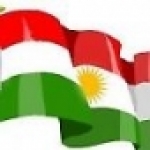[center][color=#0033CC][size=large][i][b]The Stolen Kurdish History By The Persians / Persler Tarafindan Çalinan Kurdlerin Tarihi (Video)
[/b][/i][/size][/color][/center]
[center]www.vtubetools.com[/center]
Soraya Fallah on the role of Lullabies in the Kurdish Culture /
Soraya Fallah on the role of Lullabies in the Kurdish Culture / Kurd Anneleri Ninni'lerinin (LorÃyén Dayikan) Kurd Kültürü ve Dili Üzerindeki Rolü
"Kurdish Mothers as Artists and Peaceful Revolutionaries against Genocide through the Singing of Lullabies"
By: Soraya Fallah
I am going to attempt to make a claim. This claim is that the Kurdish mother, not just as an individual, but as a collective entity, has played a crucial role in the perseverance of the Kurdish identity, specifically in implanting language and culture in her infant. Kurdish mothers, do this in many ways of course. I will be examining the role of songs, such as folkloric lullabies, and how they help endow the Kurdish language, culture, and identity as a whole. Knowing historical context on Kurdish question is very important in shedding light on why the Kurds have had to rely on oral history, in the form of folkloric songs and epic poems to instill their culture and forbid it from the eradication desired by external forces.
[center][/center]
[center][/center]
The Kurdish mother is highlighted here, not just as a group of individual mothers who have often faced the premature death of their children but do not perish themselves. They are not just seen as a collection of individual women who lose husbands to war and gendercidal campaigns but continue to remain functional.
The Kurdish mother is examined here as a collective force. Kurdish mothers are seen as the key to the preservation of the Kurdish identity. For the Kurdish people the "mother tongue," takes on a literal meaning. A Kurdish mother spends much of her time gently rocking the cradle back and forth, while in a soft gentle voice singing Kurdish folkloric lullabies to her infant. These lullabies were sung to her by her mother and taught to her as she watched her mother singing them to her siblings when they were infants. These lullabies were sung to her when her mother carried her on her back and worked in the fields, or when they were forced to flee to the mountains as refugees from wars or natural disasters. These lullabies were sung to her when a loved one was lost, killed, or passed away.
As a child she has practiced singing these lullabies to either a sibling or a ragged doll in practice for her inevitable future, and now she lovingly sings to soothe herself and bring tranquility to her newborn. But these lullabies are far more than melodic songs used to bring sleep to a child's eyes. In many psycholinguistic researches done by Anne Fernald, it is stated that infants' response to speech is based on the musical qualities of a mother's communication. This is culturally universal and highly effective in an infant's language development. Hence a lullaby is a child's first lesson in life, but more specifically first language instruction. Through the lullaby the mother uses what Fernald and other psycholinguists call "motherese" to teach not only the language but also convey a message of affection and protection. According to a study on infant behavior and development in 1996, though the infant might be oblivious to the semantic content of the mother's speech or song, they are well aware of the intonations and can make affective meaning from them.
By looking at these psycholinguistic and infant development studies, I was able to confirm my suspicion that lullabies play a large role in the transference of early language to an infant. Since these lullabies are typically sung by mothers, we can then also conclude that a mother is an infant's first introduction to the mother tongue and the mother culture. Mackinlay and Bakerby in an article called "Nurturing Herself, Nurturing Her Baby" say that, "Babies are recipients rather than performers, and thus lullabies are not intended to be sung by children but rather to be sung to and for the child by an adult. Most often, the performance of lullabies is considered to be the domain of women, and these musical moments can provide the infant with significant physical, emotional, mental, and social contact with...the infant's mother."
In the Kurdish culture, it is expected that a mother sings lullabies to her child throughout the day. Although infants might not be fully aware of the context of the lullabies sung to them, other psychological studies point to the fact that an infant can clearly distinguish a mother's pitch, tonality, and emotion. Studies comparing Hindi-speaking and English-speaking mothers singing lullabies have pointed out that Hindi mothers are more likely to sing soothing lullabies, while English-speaking mothers sing more arousing, playful songs to their infants. This difference in lullaby tonalities is a clear cultural difference that the mothers transfer to their infant. Kurdish mothers also transfer a set of cultural tones and emotions to their infants unique to the Kurdish identity. I have so far established the importance of lullabies and how they help the mother-infant relationship, as well as the ability of language development and cultural transference through lullabies.
The many genocides directed at the Kurds have often been gendercides, which means that males 12 and up have made up the majority of the targeted victims. This is due to the fact that most of the guerilla resistance movements are made up of men. Women do participate in guerilla combat as well; however, the female force makes up a much smaller group than the male. The Kurdish culture, like many others in the region, is a patriarchal society. Although the large death toll of men has forced women to take over less orthodox roles and expand their domestic duties, the authorities have wanted to cripple the Kurdish communities by eradicating the dominant workforce. All of these reasons have made the mother the essential source of language and culture for her child in times of conflict and post-conflict, at times simply because no father has been available. Due to war and forced migration, she has become not just the nurturer but also the protector and the teacher.
Lullabies are also a safe way to speak the "mother tongue" in an environment where speaking Kurdish has been illegal. It is a whispered performance. It is less likely to be heard by authorities and it is a lesson that can be taught without a classroom. When taking on this topic, I began reviewing all the lullabies I had in my memory and I further inquired by calling Iran and speaking to a few Kurdish scholars including my uncle who is a musician and has done scholarly work regarding Kurdish folklores. He provided me with a number of lyrics to lullabies written by famous poets and other songs, which have been passed down orally. In the study by Mackinlay and Bakerby in Nurturing Herself, Nurturing Her Baby, it is pointed out that "sung texts, lullabies also serve as an outlet for emotional engagement and expression by the performer, thus serving the dual function of soothing a child while simultaneously releasing the singer's own feelings of desire and discontent. The song texts of lullabies can therefore reflect social and musical themes of interest to mothers and adult listeners." This is clearly present in the Kurdish lullabies. Much of the lyrics reflect a collective sadness of a nation.
The Kurdish lullabies I was looking at all seemed to have two very distinct features in common. The first is that they are all very affectionate and express the willingness of the mother for unlimited sacrifice to the child. The second feature is that in almost all of them the lullaby serves as a means for the mother to express her discontent about the misery of her "unborn" nation, Kurdistan, and her hope that the child will either see a better future or create a better future. Consider the following translations of a very famous lullaby by one of the most notable Kurdish poets Hajar:
My Cherub, the brightness of the iris of my eyes
The bond between my heart and soul, the giver of strength to my breath
Fresh scent of herbs, my crimson flower
The extinguisher of the burning coil in my heart
The bird of my being, veins of my life
My honey and sugar, candy and sweets
Sleep. It's late, dream sweet dreams
While the rooster is still quiet.
La lay la lay, my child. Sleep.
Tonight sleep will not come to me.
Don't weep, my sweet child
I know you're crying because of your cradle
You're wondering:
"Why am I confined here? And my hands have been tied up"
Only the Kurds have this bondage ritual
Why all of these chains and handcuffs?
Hey laya laya, my child, sleep
Listen, so I can tell you why this is so
It's true. You're the offspring of legends
The new generation of pure Kurds
But because Kurds have no friends
Our share in the world is prison and torture
I tie you so you mature safely
You cannot die in solitary while I am alive
I no longer have tolerance for your suffering
I never want to see your death
Hey laya laya, my child, sleep
I have thousands of advice for you
My long life I dedicate to you
Hundreds of bitter sweetness I will taste for you
Your sapling I will water with my tears
At every hour, in midnight hours,
I will give this sapling nurturing
I will go around to every wise person for you
Until I can rest under the shadow of your tall tree
But the truth is that the minute you mature
The occupiers will cut you down and will not have mercy on me
Hey laya laya, my child sleep.
The ground over my head, all my work gone by the wind
My dearest, if you want the injustice to end
Take up a pen and become a scholar
Don't ever stop learning
Until when you and your brother can claim your lost share of our fate
(Peot: Rahim Sharafkandi (Hajar), translated by: Cklara Moradian
Aside from words of affection, this lullaby is full of sorrow about the current state of existence as a Kurd, and at the same time it provides words of wisdom for the child, as the mother attempts to raise a future generation.
In another very folkloric lullaby whose author is unknown, the mother sings to the child:
Lay lay, the sapling of my fate
My companion in hardship
Our journey is so far
It's a bloody road
Sleep, your mother's baby
This song brings an image of refugee roads and mother's singing in the mountains with their infants on their backs. In another verse of the same song the mother refers to the child as "suffering tongue tied child" but this might be simply expressing her own inability to speak up and her own suffering.
A Kurdish scholar, Rasoul Mirzapur, beautifully describes, the lullaby is a Kurdish mother's way of "crying on the shoulder of a companion who is presently helpless. It is releasing oneself during sleepless nights and the request of companionship during hardship. It is finding and growing an advocate and protector, a healer in the child so that the mother can have a refuge in the future."
In another Kurdish lullaby the mother sings in agony that "sleep child, sleep, your father is gone to war and will not return." In these lyrics we are faced with the historical realities of the Kurdish wife who must face the loss of her husband to gendercide.
In other lullabies the mother tells the child that he/she can only die through martyrdom and will only be allowed to leave for the nation of Kurdistan. These songs all not only give us an idea of what a Kurdish mother's oral history is but also the culture that is being transferred through her to the infant. She, in fact, is the child's first revolutionary, first introduction to nationalism, to history, and to the burdens of a denied identity. Tying in the theme of motherhood and revolution, we can say that even illiterate village mothers of Kurdish mountains are both revolutionaries and artists. By raising melodic voices they take part in the universal art of music and storytelling through songs. By singing the agonizing history of not just her own personal experience but her collective heritage, she remains a peaceful revolutionary and plants the seed of culture in her infant.
A Kurdish lullaby I sang to my daughter Cklara Moradian
Name: Berxolekem
Hey lay hey lay hey laya
your mother's sweet baby
why is sleep not coming to you?
Sleep darling, it's late
The world is dim and silent
I'm confined in this solitude
Lay Lay your mother's sweet baby
The child of my furious nation
You're my hope for existence
Hey laya laya laya
The hope of your mother's being
Why is Kurdish existence this manner?
Lay lay sapling of my fate
The companion of hardship
The journey to the peek is distant
The process is crimson blood
Hey laya laya laya
Your mother can not raise her voice
Tears are choking in her throat
Why is Kurdish existence this manner?
(Speaking to the child)...
Lay lay
a drop of Sirvan (river running between Iran and Iraq border)
Home wrecked and forced into mountains
We were slaughtered by the hundreds
We were tied and imprisoned
We've been denied our tongue and land
We've been annihilated in the snow
Hey laya lay laya
The flower of your mother's garden
Tell me why don't you sleep
But
(singing again)
Life will not always remain this way
There will come a day when
a thousand flaming candles will burn,
the strong sun rays in the meadows will shine
the sound of the footsteps of the dawn will be heard
in anticipation of the people's celebration
sleep my tiny baby
our future is this way
awake tomorrow in laughter
human rights will triumph one day
(Written in Kurdish by Soraya Fallah
Translation to English by Cklara Moradian






History and Culture of the Kurdish People / Kurdlerin Tarihi ve